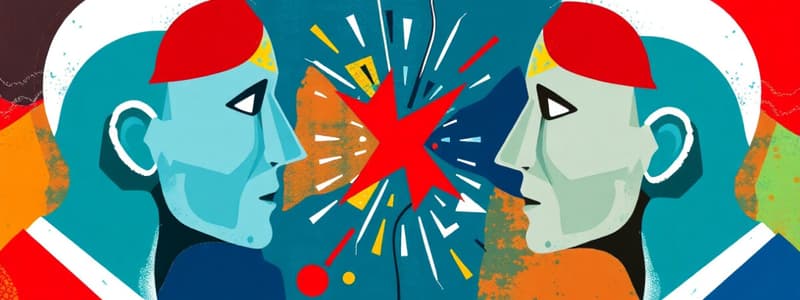Podcast
Questions and Answers
What influences how individuals modify their responses to a situation?
What influences how individuals modify their responses to a situation?
- The historical context of the situation
- The opinions of their peers
- The degree of experience they have
- The evolving sense of the threat they confront (correct)
How do individuals typically manage conflict based on the content?
How do individuals typically manage conflict based on the content?
- By acting constructively (correct)
- By escalating the situation
- By avoiding confrontation at all costs
- By seeking external help immediately
What is the relationship between responses and perceived threats?
What is the relationship between responses and perceived threats?
- Responses evolve as the sense of threat changes (correct)
- Responses are less significant when threats are minimal
- Responses remain constant regardless of perceived threat
- Responses become more aggressive with increased threat perception
What role does the sense of threat play in conflict management?
What role does the sense of threat play in conflict management?
Which statement best summarizes the approach to managing conflict described?
Which statement best summarizes the approach to managing conflict described?
What is Ziad Mahana's associated number in the content?
What is Ziad Mahana's associated number in the content?
Which subject is Dr. associated with in this context?
Which subject is Dr. associated with in this context?
How many lectures are mentioned in the provided content?
How many lectures are mentioned in the provided content?
What is the role of Ziad Mahana in the presentation?
What is the role of Ziad Mahana in the presentation?
What can be inferred about the content based on the provided information?
What can be inferred about the content based on the provided information?
What is a key factor in relieving stress according to individual responses?
What is a key factor in relieving stress according to individual responses?
How should one approach stress relief based on sensory input?
How should one approach stress relief based on sensory input?
Why is it important to customize stress relief methods?
Why is it important to customize stress relief methods?
Which of the following statements is true regarding sensory input and stress relief?
Which of the following statements is true regarding sensory input and stress relief?
What is a common misconception about relieving stress?
What is a common misconception about relieving stress?
What is one action suggested to manage conflict effectively?
What is one action suggested to manage conflict effectively?
How can confidentiality impact a conflict discussion?
How can confidentiality impact a conflict discussion?
What approach should be avoided when addressing conflicts?
What approach should be avoided when addressing conflicts?
What is a benefit of keeping conflict discussions confidential?
What is a benefit of keeping conflict discussions confidential?
What is the primary goal of reminding everyone that the conflict is not personal?
What is the primary goal of reminding everyone that the conflict is not personal?
What opportunity does the integration of needs provide?
What opportunity does the integration of needs provide?
What is an outcome of bringing new time, energy, and ideas?
What is an outcome of bringing new time, energy, and ideas?
Which of the following is NOT a benefit of integrating needs?
Which of the following is NOT a benefit of integrating needs?
How does consensus benefit the integration of needs?
How does consensus benefit the integration of needs?
What does bringing new ideas primarily contribute to a collaborative environment?
What does bringing new ideas primarily contribute to a collaborative environment?
What is the main characteristic of the avoiding conflict style?
What is the main characteristic of the avoiding conflict style?
What is meant by 'win-win problem-solving'?
What is meant by 'win-win problem-solving'?
What type of individuals are associated with the collaborating style?
What type of individuals are associated with the collaborating style?
How do avoiding and collaborating styles differ?
How do avoiding and collaborating styles differ?
What is the outcome of pooling individual needs in problem-solving?
What is the outcome of pooling individual needs in problem-solving?
What is a key reason why relationship conflicts should be managed in a healthy manner?
What is a key reason why relationship conflicts should be managed in a healthy manner?
Which statement accurately reflects the nature of conflicts in relationships?
Which statement accurately reflects the nature of conflicts in relationships?
What is an essential aspect of managing conflicts in relationships?
What is an essential aspect of managing conflicts in relationships?
Why is it crucial to learn to deal with conflicts in relationships?
Why is it crucial to learn to deal with conflicts in relationships?
What misconception might individuals have about conflicts in relationships?
What misconception might individuals have about conflicts in relationships?
What is the primary benefit of understanding true disagreement among parties?
What is the primary benefit of understanding true disagreement among parties?
Which statement best describes the relationship between true disagreement and problem-solving?
Which statement best describes the relationship between true disagreement and problem-solving?
How does recognizing true disagreement benefit the negotiation process?
How does recognizing true disagreement benefit the negotiation process?
Why is it important to differentiate between perceived and true disagreement?
Why is it important to differentiate between perceived and true disagreement?
What ultimate goal is achieved by understanding true disagreement?
What ultimate goal is achieved by understanding true disagreement?
What impact does holding on to old hurts and resentments have on conflict resolution?
What impact does holding on to old hurts and resentments have on conflict resolution?
Which statement best reflects the rationale behind not looking to the past in conflict management?
Which statement best reflects the rationale behind not looking to the past in conflict management?
What is a significant consequence of being unable to let go of past resentments?
What is a significant consequence of being unable to let go of past resentments?
In conflict situations, focusing on the present rather than the past primarily helps individuals to:
In conflict situations, focusing on the present rather than the past primarily helps individuals to:
What is one reason why reassessing past grievances can hinder effective conflict management?
What is one reason why reassessing past grievances can hinder effective conflict management?
Which statement accurately describes the competing style of conflict management?
Which statement accurately describes the competing style of conflict management?
What primary trait distinguishes the accommodating or smoothing style from the competing style?
What primary trait distinguishes the accommodating or smoothing style from the competing style?
Which of the following accurately reflects a characteristic of individuals employing the competing style?
Which of the following accurately reflects a characteristic of individuals employing the competing style?
In the context of conflict resolution, an accommodating individual is most likely to:
In the context of conflict resolution, an accommodating individual is most likely to:
What does the contrasting nature of the competing and accommodating styles imply about conflict management approaches?
What does the contrasting nature of the competing and accommodating styles imply about conflict management approaches?
What is one significant benefit of reaching a consensus in conflict management?
What is one significant benefit of reaching a consensus in conflict management?
How does introducing new ideas contribute to resolving conflicts?
How does introducing new ideas contribute to resolving conflicts?
What is primarily enhanced by bringing in new time and energy during conflict resolution?
What is primarily enhanced by bringing in new time and energy during conflict resolution?
What consequence may arise from individuals not stating their needs in a conflict scenario?
What consequence may arise from individuals not stating their needs in a conflict scenario?
Which of the following best describes the concept of integrating needs in conflict management?
Which of the following best describes the concept of integrating needs in conflict management?
How is coercive power typically viewed in the context of relationship management?
How is coercive power typically viewed in the context of relationship management?
What is a common belief regarding the importance of relationships in conflict management?
What is a common belief regarding the importance of relationships in conflict management?
What is a potential drawback of not reaching a consensus during negotiations?
What is a potential drawback of not reaching a consensus during negotiations?
What is a potential drawback of prioritizing relationship preservation in conflicts?
What is a potential drawback of prioritizing relationship preservation in conflicts?
What underlying principle might guide individuals who devalue future relationships in conflict situations?
What underlying principle might guide individuals who devalue future relationships in conflict situations?
Flashcards
Evolving Threat Perception
Evolving Threat Perception
Responses to threats can change based on how the threat is perceived.
Constructive Conflict Management
Constructive Conflict Management
When we deal with a conflict in a positive, productive way.
Stress Relief is Individual
Stress Relief is Individual
Different people find different things calming.
Find Your Soothing Sensory Input
Find Your Soothing Sensory Input
Signup and view all the flashcards
Sensory Preferences for Stress Relief
Sensory Preferences for Stress Relief
Signup and view all the flashcards
Conflict is not personal
Conflict is not personal
Signup and view all the flashcards
Keep the discussion confidential
Keep the discussion confidential
Signup and view all the flashcards
Consensus
Consensus
Signup and view all the flashcards
Integration of Needs
Integration of Needs
Signup and view all the flashcards
New Time, Energy, and Ideas
New Time, Energy, and Ideas
Signup and view all the flashcards
Collaborating
Collaborating
Signup and view all the flashcards
Avoiding
Avoiding
Signup and view all the flashcards
Conflict Management Styles
Conflict Management Styles
Signup and view all the flashcards
Avoiding Conflict Style
Avoiding Conflict Style
Signup and view all the flashcards
Collaborating Conflict Style
Collaborating Conflict Style
Signup and view all the flashcards
True Disagreement
True Disagreement
Signup and view all the flashcards
Benefits of Understanding True Disagreement
Benefits of Understanding True Disagreement
Signup and view all the flashcards
Managing True Needs
Managing True Needs
Signup and view all the flashcards
Solving Disagreements Effectively
Solving Disagreements Effectively
Signup and view all the flashcards
Effective Disagreement Resolution
Effective Disagreement Resolution
Signup and view all the flashcards
Conflict is normal and healthy
Conflict is normal and healthy
Signup and view all the flashcards
Healthy conflict management
Healthy conflict management
Signup and view all the flashcards
Two people won't always agree
Two people won't always agree
Signup and view all the flashcards
Why dwelling on the past is bad for decision making
Why dwelling on the past is bad for decision making
Signup and view all the flashcards
Past hurts blind you to the present
Past hurts blind you to the present
Signup and view all the flashcards
How past hurts affect decision-making
How past hurts affect decision-making
Signup and view all the flashcards
What is Consensus?
What is Consensus?
Signup and view all the flashcards
What is Integration of Needs?
What is Integration of Needs?
Signup and view all the flashcards
What does 'New Time, Energy, and Ideas' represent?
What does 'New Time, Energy, and Ideas' represent?
Signup and view all the flashcards
What is a key benefit of bringing different perspectives to a challenge?
What is a key benefit of bringing different perspectives to a challenge?
Signup and view all the flashcards
Why is understanding true needs important?
Why is understanding true needs important?
Signup and view all the flashcards
Low Regard for Future Relationships
Low Regard for Future Relationships
Signup and view all the flashcards
Coercive Power
Coercive Power
Signup and view all the flashcards
Power Dynamics in Relationships
Power Dynamics in Relationships
Signup and view all the flashcards
Competing Style
Competing Style
Signup and view all the flashcards
Accommodating or Smoothing Style
Accommodating or Smoothing Style
Signup and view all the flashcards
Study Notes
Conflict Management
- Conflict is a disagreement where involved parties perceive a threat to their needs, interests, or concerns.
- This definition highlights key elements: disagreement among parties, and a perceived threat.
- Disagreements often stem from differences in the positions of the conflicting parties.
- Understanding the true areas of disagreement helps in resolving the actual issues and addressing the needs of the parties involved-- leading to effective conflict management.
Parties Involved
- Conflicts often involve people who are part of a social system (e.g. a work team, family or company).
- These individuals may be influenced to take part in the conflict, even if they wouldn't identify with it in a personal sense.
- Recognizing the involvement of parties from a social system perspective can assist in identifying the influences and motives involved in a conflict.
Perceived Threat
- People frequently react to perceived threats rather than actual threats.
- People's actions, feelings, and the evolving sense of the threat are modified by this perceived threat.
- Recognizing this difference is crucial for constructive conflict resolution.
- Understanding the true threat, developing strategies to manage the issue, and reaching an agreement to resolve the perceived threats are constructive steps toward positive resolution.
- It is important to understand conflict from the perspective of the people involved to effectively address the conflict.
Conflict Resolution Skills
- Conflict resolution depends on 4 key skills:
- Quickly relieving stress, managing emotions, improving nonverbal communication, and using humor to address challenges.
- Emotional awareness is key for understanding oneself and others.
- Ignoring or suppressing emotions can lead to communication breakdowns and inability to resolve disagreements.
- Connecting to feelings helps to manage conflicts effectively.
- Conflict resolution is an essential skill to resolving disagreements and maintaining healthy relationships.
- Identifying and addressing the emotional aspects of conflict is critical for success.
Conflict Resolution Strategies
-
The Thomas-Kilmann model highlights 5 conflict resolution strategies:
- Competing (assertive & uncooperative): satisfying one's needs at the other's expense.
- Accommodating (unassertive & cooperative): satisfying another's needs at the expense of one's own.
- Avoiding (unassertive & uncooperative): neither party's needs are satisfied.
- Collaborating (assertive & cooperative): finding a solution that satisfies both parties' needs.
- Compromising (intermediate assertiveness and cooperativeness): finding a mutually acceptable solution by making concessions.
-
Effective conflict resolution involves understanding the different conflict styles and choosing the most appropriate one for the situation.
-
Learning these techniques can lead to successful relationships and outcomes.
-
Knowing when to forgive is crucial for conflict resolution.
-
Choosing your battles is important in conflict resolution; not all issues are worth your time and energy.
-
Setting boundaries is a crucial step. Everyone should acknowledge the need for boundaries and confidentiality. Conflict resolution also involves managing emotional reactions and outbursts from conflicting parties, thus avoiding further escalation or hurt feelings.
Studying That Suits You
Use AI to generate personalized quizzes and flashcards to suit your learning preferences.




